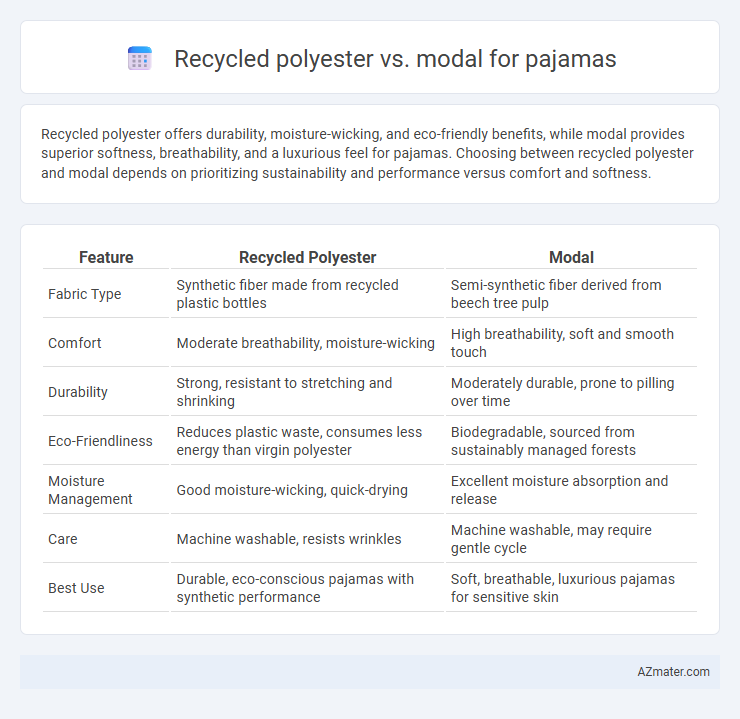Recycled polyester offers durability, moisture-wicking, and eco-friendly benefits, while modal provides superior softness, breathability, and a luxurious feel for pajamas. Choosing between recycled polyester and modal depends on prioritizing sustainability and performance versus comfort and softness.
Table of Comparison
| Feature | Recycled Polyester | Modal |
|---|---|---|
| Fabric Type | Synthetic fiber made from recycled plastic bottles | Semi-synthetic fiber derived from beech tree pulp |
| Comfort | Moderate breathability, moisture-wicking | High breathability, soft and smooth touch |
| Durability | Strong, resistant to stretching and shrinking | Moderately durable, prone to pilling over time |
| Eco-Friendliness | Reduces plastic waste, consumes less energy than virgin polyester | Biodegradable, sourced from sustainably managed forests |
| Moisture Management | Good moisture-wicking, quick-drying | Excellent moisture absorption and release |
| Care | Machine washable, resists wrinkles | Machine washable, may require gentle cycle |
| Best Use | Durable, eco-conscious pajamas with synthetic performance | Soft, breathable, luxurious pajamas for sensitive skin |
Introduction to Recycled Polyester and Modal
Recycled polyester is a sustainable fabric made from post-consumer plastic bottles, offering durability and moisture-wicking properties ideal for pajamas. Modal, a semi-synthetic cellulose fiber derived from beech trees, provides exceptional softness, breathability, and a silky feel, enhancing comfort for sleepwear. Both materials contribute to eco-friendly pajama options, balancing performance with environmental responsibility.
Understanding Fabric Origins: Recycled Polyester vs Modal
Recycled polyester originates from post-consumer plastic waste such as PET bottles, reducing environmental impact by diverting plastics from landfills and oceans. Modal is a semi-synthetic fabric derived from beech tree pulp, known for its biodegradable properties and sustainable forestry practices. Both fabrics offer eco-friendly alternatives for pajamas, with recycled polyester emphasizing plastic reuse and modal highlighting natural, renewable sources.
Environmental Impact: Sustainability Showdown
Recycled polyester for pajamas reduces landfill waste and lowers greenhouse gas emissions by repurposing plastic bottles, making it a strong candidate for eco-friendly sleepwear. Modal, derived from sustainably managed beech trees, offers biodegradability and requires significantly less water and chemicals in production compared to conventional cotton. Both fibers present sustainability advantages, with recycled polyester emphasizing waste reduction and modal prioritizing renewable resource use and biodegradability.
Comfort and Feel: Which Fabric Wins for Pajamas?
Recycled polyester offers durability and moisture-wicking properties that keep pajamas lightweight and quick-drying, ideal for comfort in warm climates. Modal, derived from beech tree pulp, provides a silky-smooth, breathable texture with excellent softness, making it exceptionally comfortable against the skin. For pajamas focused on luxurious feel and breathability, modal typically wins, while recycled polyester excels in performance and eco-friendly attributes.
Breathability and Moisture Management
Recycled polyester offers excellent moisture-wicking properties, drawing sweat away from the skin to keep the wearer dry during sleep. Modal, derived from beech tree fibers, provides superior breathability and softness, enhancing comfort for sensitive skin. For pajamas, choosing recycled polyester ensures effective moisture management, while Modal excels in maintaining airflow and a gentle touch against the skin.
Durability: Longevity of Pajamas Made from Each Material
Recycled polyester pajamas exhibit superior durability due to the inherent strength of synthetic fibers, offering resistance to stretching, shrinking, and abrasion, thus extending their lifespan significantly. Modal pajamas, while soft and breathable, tend to be less durable, with fibers prone to pilling and wear over time, especially after repeated washing. The longevity of recycled polyester pajamas typically surpasses that of modal, making them a more resilient choice for long-term use.
Maintenance and Care Requirements
Recycled polyester pajamas require minimal maintenance, as the fabric resists shrinking, stretching, and wrinkles, allowing for easy machine washing in cold water and tumble drying on low heat. Modal pajamas, while soft and breathable, demand gentler care such as washing in cold water with mild detergent and air drying or tumble drying on low to preserve fabric integrity and prevent pilling. Both fabrics benefit from avoiding bleach and fabric softeners to maintain longevity and comfort in pajamas.
Cost Comparison: Affordability Analysis
Recycled polyester pajamas generally offer a more affordable option compared to Modal, with prices often 20-30% lower due to lower production costs and widespread manufacturing infrastructure. Modal fabric, derived from beech tree pulp, tends to have higher material and processing expenses, resulting in premium pricing typically favored for luxury sleepwear. Consumers prioritizing budget-friendly pajama choices often find recycled polyester provides cost savings without sacrificing durability or comfort.
Fashion Versatility and Design Options
Recycled polyester offers exceptional durability and moisture-wicking properties, making it ideal for versatile pajama designs that combine functionality with contemporary fashion trends. Modal provides a luxurious, soft texture with excellent breathability, allowing designers to create elegant, comfortable pajama styles that emphasize drape and fluid movement. Both fabrics support sustainable fashion while enabling diverse design options ranging from casual loungewear to stylish sleepwear collections.
Final Verdict: Choosing the Best Material for Eco-Friendly Pajamas
Recycled polyester offers durability, moisture-wicking properties, and significant environmental benefits by reducing plastic waste, making it a strong choice for eco-friendly pajamas. Modal, derived from sustainably managed beech trees, excels in softness, breathability, and biodegradability, appealing to those prioritizing comfort and natural fibers. The best material depends on balancing durability and sustainability preferences, with recycled polyester suitable for performance-focused pajamas and modal ideal for softness and environmental biodegradability.

Infographic: Recycled polyester vs Modal for Pajama
 azmater.com
azmater.com